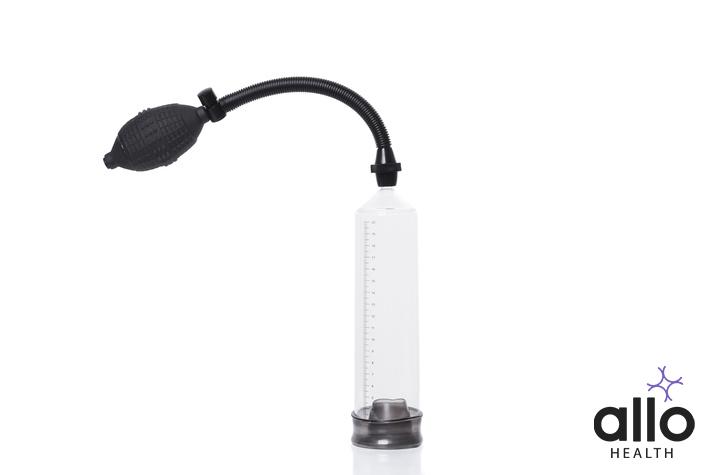You Are Not Alone: How Common Is Erectile Dysfunction?

Allo Health is dedicated to personalized well-being, offering support and trusted information tailored to individual health goals. The platform emphasizes human-generated content, led by a distinguished medical team of experts, including physicians and sexual health specialists. Their commitment to credibility involves rigorous fact-checking, authoritative research, and continuous updates to ensure accurate, up-to-date information. Allo Health's unique approach goes beyond conventional platforms, providing expert-led insights and a continuous commitment to excellence, with user feedback playing a crucial role in shaping the platform's authoritative voice.

Dr Ooha is a graduate of AFMC and a practicing neuropsychiatrist. Over the last 5 years, she has worked with patients facing various psychiatric challenges ranging from Schizophrenia, Bipolar disorder and OCD to Anxiety disorders, ADHD, personality disorders and sexual problems. She has a keen interest in expanding her repertoire in the areas of Forensic Psychiatry, Child and Adolescent issues and Sexual Wellness with evidence-based approaches and further adding to the fount of knowledge with original research.
Why This Was Upated?
Our experts continually monitor the health and wellness space, and we update our articles when new information became available.
Updated on 17 April, 2024
- Article was updated as part of our commitment to diversity, equity, and inclusion.

"The following blog article provides general information and insights on various topics. However, it is important to note that the information presented is not intended as professional advice in any specific field or area. The content of this blog is for general educational and informational purposes only.
Book consultation
The content should not be interpreted as endorsement, recommendation, or guarantee of any product, service, or information mentioned. Readers are solely responsible for the decisions and actions they take based on the information provided in this blog. It is essential to exercise individual judgment, critical thinking, and personal responsibility when applying or implementing any information or suggestions discussed in the blog."
Erectile dysfunction (ED) is a common health condition where a man finds it hard to have or keep an erection firm enough for sexual activity. It’s not just a sexual dysfunction; it often links to larger health problems. Here’s a simple guide to understanding this concern and know how common is erectile dysfunction.
What is Erectile Dysfunction?
A penile erection happens when blood flow increases into the erectile tissue. Anything that interferes with this blood flow can lead to erectile dysfunction. ED show as challenge in maintaining an erection firm enough for sexual activity, is not uncommon. Studies show a varying prevalence, indicating that this condition affects a significant portion of the male population at some point in their lives.
Risk Factors of Erectile Dysfunction
Understanding the risk factors of erectile dysfunction (ED) is key to prevention and management. Here’s a more detailed look into each factor:
Age Factor
- Increased Prevalence of Erectile Dysfunction with Age: The likelihood of experiencing ED increases as men get older. This is often due to a natural decline in physical health and sexual function with age.
Health Conditions Linked to ED
- Cardiovascular Disease: Heart health directly impacts blood flow, crucial for maintaining an erection. Heart disease can thus be a significant contributor to ED.
- High Blood Pressure: This condition can damage blood vessels, affecting blood flow to the penile area.
- Diabetes: It can cause nerve damage and blood vessel impairment, which are critical in achieving and maintaining erections.
- Metabolic Syndrome: This cluster of conditions, including high blood pressure, high insulin levels, body fat around the waist, and high cholesterol, can lead to ED.
Lifestyle Factors Affecting ED
- Smoking: It harms blood vessels and restricts blood flow, making it harder to achieve an erection.
- Excessive Alcohol Use: While moderate drinking might not cause ED, chronic and excessive alcohol consumption can impair sexual performance and hormone levels.
- Lack of Physical Activity: Regular physical activity helps maintain good blood circulation and overall health, which are vital for sexual health.
Obesity and Its Role in ED
- Impact on Vascular Health and Diabetes: Being overweight increases the risk of vascular diseases and diabetes, which are major factors in the development of ED.
Causes of Erectile Dysfunction
Erectile dysfunction (ED) can be a result of various medical conditions, each affecting sexual function in different ways:
- Cardiovascular Disease: This includes any problem with the heart and blood vessels. Since erections depend on blood flow, concerns with cardiovascular health can directly impact the erection firmness, making it difficult to achieve or maintain a penile erection.
- High Blood Pressure: Elevated blood pressure can damage blood vessels over time. This damage can affect the blood flow necessary for an erection, contributing to ED.
- Metabolic Syndrome and Diabetes: Both conditions can lead to significant damage to nerves and blood vessels. This damage can impede the signals required for sexual stimulation and the blood flow needed for maintaining an erection.
- Spinal Cord and Nerve Injuries: Damage to the spinal cord or nerves, especially those that control erections, can directly interfere with sexual function. Such injuries may prevent the transmission of signals from the brain to the erectile tissue.
Diagnosis and Physical Examination
When you seek medical attention for ED, the process typically involves:
- Physical Exam: A comprehensive physical examination is crucial. This includes a detailed look at your circulatory health and physical factors that might be contributing to ED.
- Discussion of Symptoms: You will discuss the specific symptoms of erectile dysfunction you’re experiencing. This helps in understanding the severity and pattern of your ED.
Tests and Assessments
To understand the underlying causes of ED, various tests and assessments may be conducted:
- Evaluating Circulatory Health: This involves checking the health of your circulatory system to see if poor blood flow is a factor in your ED.
- Blood Pressure and Heart Function Tests: These tests are important to identify any cardiovascular diseases that might be contributing to ED.
- Blood Tests: These can check for a range of concerns, including diabetes, high cholesterol levels, and hormonal imbalances. Imbalances in hormones like testosterone can significantly impact erectile function.
Treatment for Erectile Dysfunction
Erectile dysfunction (ED) treatments vary based on what’s causing it and how severe it is. Here’s a breakdown of the different treatment options, explained in simple terms.
Medical Treatment and Drug Therapy
- Prescription Drugs: These are medicines that help improve blood flow to the erectile tissue. They’re one of the most common treatments for erectile dysfunction.
- Testosterone Replacement Therapy: This is used if ED is caused by low levels of testosterone, a key hormone in men.
- Drug Side Effects: Sometimes, other medications you’re taking might contribute to ED. In such cases, doctors manage or adjust these medications.
Surgical and Non-Surgical Options

- Vascular Surgery: For men with severe vascular disease affecting blood flow, surgery on blood vessels may be necessary.
- Vacuum Devices: These are mechanical tools that help a man achieve an erection by increasing blood flow to the penis.
- Radiation Therapy: This might be used to treat ED that’s related to cancer treatments.
Natural Supplements for Erectile Dysfunction

These supplements are thought to improve blood flow, enhance sexual function, and support overall health.
- L-arginine: This amino acid is believed to boost nitric oxide levels in the body, which can help relax blood vessels and improve blood flow, potentially aiding in erections.
- Ginseng: Often referred to as “herbal Viagra,” ginseng has been used for centuries in traditional medicine. It’s thought to improve sexual function in men with ED, possibly by enhancing blood flow.
- Ginkgo Biloba: Known for its ability to enhance blood circulation, Ginkgo biloba may help with ED by increasing blood flow to the penis.
- Horny Goat Weed (Epimedium): This herb contains compounds that may help increase blood flow and improve sexual function.
- Yohimbe: Derived from the bark of an African tree, Yohimbe has been traditionally used to treat ED. It’s believed to work by increasing blood flow and nerve impulses to the penis.
- Zinc Supplements: Zinc plays a role in testosterone production, which is crucial for sexual health. A deficiency in zinc can lead to ED.
- DHEA (Dehydroepiandrosterone): This is a natural hormone that can be converted into testosterone and estrogen in the body. Supplements might help with ED, especially if one has low levels of this hormone.
- Fenugreek: This herb is known for its ability to improve libido and sexual performance.
Lifestyle Changes
- Physical Exercise: Regular exercise is crucial. It helps improve circulatory health and can reduce risk factors for diseases that can cause ED, like heart disease.
- Balanced Diet: Eating a healthy, balanced diet is important. It helps manage medical conditions that can lead to erectile dysfunction, such as diabetes or high blood pressure.
Prevention Tips for Erectile Dysfunction
Understanding the causes of erectile dysfunction related to medical conditions can help in developing strategies to prevent or minimize its impact. Here are some tips:
Healthy Lifestyle Choices:
- Engage in regular physical activity to boost circulatory health.
- Eat a balanced diet to maintain a healthy weight and reduce the risk of diabetes and vascular disease.
Managing Chronic Health Conditions:
- Regularly monitor and manage conditions like high blood pressure, diabetes, and heart disease.
- Consult with healthcare providers to keep these conditions under control.
Manage Your Mental Health:
- Address any mental health concerns such as stress, anxiety, or depression, as they can impact sexual function.
- Seeking professional help for mental health concerns is crucial in reducing the risk of ED.
ED is a common concern, often linked to other medical and lifestyle factors. Understanding its causes, seeking proper medical treatment, and maintaining a healthy lifestyle are key to managing this condition. Remember, it’s not just about sex lives; it’s about overall health and well-being.
Most Asked Questions
-
What is erectile dysfunction (ED) and how common is it?
Erectile Dysfunction, often referred to as ED, is a condition where maintaining a firm erection for sexual activity becomes challenging. It’s quite common, affecting a considerable number of men, especially as they age. Factors like cardiovascular disease, high blood pressure, and metabolic syndrome can increase the risk.
-
Can lifestyle changes improve erectile dysfunction?
Yes, lifestyle changes can have a positive impact on ED. Engaging in regular physical activity, maintaining a healthy diet, avoiding smoking and excessive alcohol, and managing stress can all contribute to better erectile function and circulatory health.
-
Are there medical treatments available for ED?
Absolutely. Treatment options for ED include prescription drugs that improve blood flow, testosterone replacement therapy if hormonal imbalances are present, and sometimes vascular surgery for severe cases. Your doctor can provide guidance based on your specific health condition.
-
How does erectile dysfunction relate to heart disease?
ED and heart disease are closely related because both involve the health of blood vessels. Conditions that affect your cardiovascular system, like heart disease or high blood pressure, can also impair the blood flow needed for a firm penile erection.
-
What should I do if I think I have erectile dysfunction?
If you’re experiencing symptoms of ED, it’s important to seek medical attention. A doctor can conduct a physical examination, discuss your sex lives and health history, and may suggest tests to evaluate your blood pressure, heart function, testosterone levels, and other factors related to ED.






































